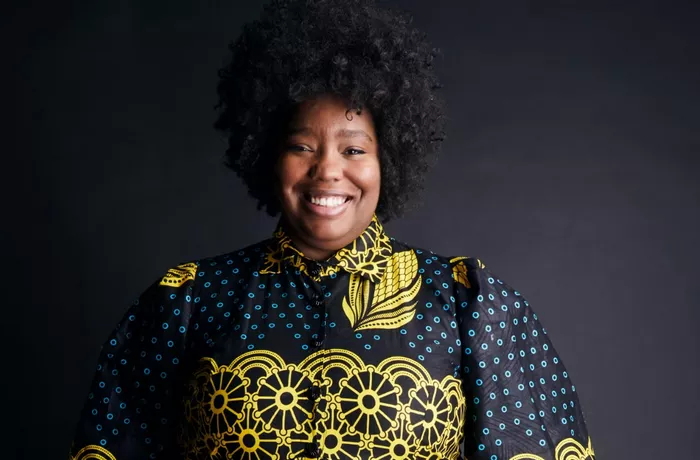Cheyney McKnight, a historical interpreter, researcher, and designer, has dedicated her career to using ancestral design techniques to educate and inspire. She is the founder of Not Your Momma’s History, an initiative launched in 2014 that produces educational programming and videos about slavery and the Black experience. Collaborating with museums, historical sites, and organizations, McKnight works to bring history to life through storytelling, fashion, and interpretation. She also holds the role of Manager of Living History at the New York Historical Society.
Her design work draws from African American clothing traditions of the 18th and 19th centuries, blending historical techniques and silhouettes with modern prints and textiles. All her pieces are made to order, rooted in heritage while adapted for contemporary expression.
McKnight’s journey as a designer began with her work as a reenactor and historical interpreter, during which she wore the types of clothing African Americans, both enslaved and free, would have worn in the antebellum South through the late 1800s. However, she became disillusioned with aspects of reenactment culture. She found it troubling that some portrayals romanticized the past, offering a nostalgic vision of a time when Black people were treated as property.
A pivotal moment occurred during a reenactment in Gettysburg, Virginia, where McKnight and other Black interpreters portrayed free African Americans fleeing from Confederate reenactors. After the performance, some parents expressed frustration that they had to explain to their children why “Miss Cheyney” was running from people they had been taught were “the good guys.” This confrontation made McKnight realize how deeply clothing and performance could challenge misconceptions and provoke important conversations.
McKnight also worked at Colonial Williamsburg, where she faced inappropriate behavior from male visitors. She described the discomfort of being harassed while wearing clothing historically associated with her ancestors, calling the experience deeply unsettling. This discomfort spurred her to begin modifying her wardrobe—still grounded in historical silhouettes, but with fabrics and prints that reflected her personal and cultural identity. She started with denim and gradually integrated West African prints.
As interest in her unique attire grew, McKnight felt compelled to design for others. She began researching fabrics from across the African diaspora and sought to create clothing that would reflect Black heritage and identity in daily life. Her goal became to develop a “cultural costume” alongside everyday fashion for Black American women.
Her resulting designs include structured bodices, full skirts, and detailed sleeves, inspired by ancestral craftsmanship. These designs fall into two main categories: custom garments made for clients, and pieces she gifts to descendants of enslaved people at historical sites she visits. For each piece, McKnight begins with in-depth research—studying original garments, exploring museum collections, and drawing from her own archive of historical bodices.
Depending on the intended level of historical accuracy, she selects fabrics accordingly. For more authentic recreations, she sources materials from specialized suppliers who carry textiles similar to those used in the 18th and 19th centuries. For modern designs, she often selects bold, unconventional prints and textiles to tell new stories through old forms.
McKnight sometimes constructs the garments herself, but also collaborates with seamstresses and dressmakers who share her interest in historical fashion. Interestingly, her research also includes minstrel shows and blackface memorabilia—not to imitate them, but to uncover and understand the distorted roots of American cultural symbols. She emphasizes that many aspects of Black culture were caricatured in these performances, only to be reappropriated by Black communities with added soul and meaning. Eventually, these reimagined forms were again appropriated in exaggerated minstrel portrayals, creating a complex feedback loop that McKnight feels must be examined and explained.
She believes her work offers important context in current discussions about fashion and cultural heritage. The garments of the past, she argues, communicate resistance, creativity, and community. They offer a lens through which to view both oppression and resilience. McKnight sees clothing as political, as a tool for empowerment, and as a bridge to ancestral wisdom.
Her mission is to encourage ongoing conversations within Black communities about history and identity through clothing. She hopes that her designs prompt reflection and cultural stewardship. Her everyday wear designs, heavily inspired by Black women of the 1890s—including figures such as Ida B. Wells and unnamed sharecroppers—aim to honor the courage and style of women during a time of both political progress and social backlash.
For McKnight, these garments were not just fashion but armor. The bold shoulders and tailored bodices worn by Black women of that era embodied strength and defiance. By reviving these styles and adapting them for modern wear, she aims to equip contemporary Black women with clothing that is not only stylish but deeply meaningful. Her work is a living tribute to the resilience, artistry, and cultural power of her ancestors.
Related Topics
- 7 Office-Ready Summer Outfits That Marry Comfort and Style
- Democracy Clothing Launches Free Jeans Pop-Up for Austin Women
- Cool Women Share Summer Style Advice for Men This Season

